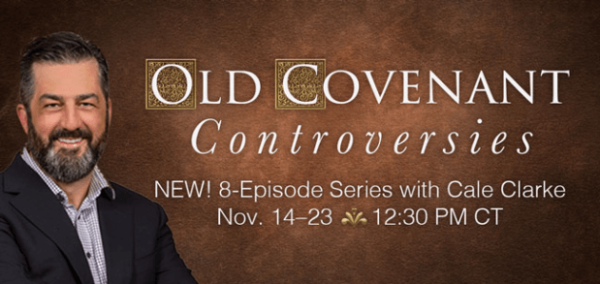Some Christians will argue against evolution because they believe it takes God out of the equation when it comes to the creation of mankind and our possession of a soul, intellect, and free will. Some secularists will say that Christianity is false because evolution has been proven and the God the creator cannot coexist with that scientific process. But the fact is, these two things can coexist. And not only that, but whether the homo sapiens developed through evolution or not has nothing to do with the message of the Bible.
Cale Clarke continued his series Old Covenant Controversies on The Faith Explained with part two of the evolution topic.
Cale began dissecting the argument of evolution vs. religion by explaining an idea known as the “two books approach”. This approach rejects the idea of science and religion as antitheses and embraces the idea of cooperation. This model is well-known as the basis for articulating the harmony that can be found between scripture and science. Namely, it affirms the fact that science can in fact help us read the Bible better, and that “religion can purify science from idolatry and false absolutes.” (Pope John Paul II)
Cale turned to the book of Esther to illustrate his point of mutual enlightenment. This Old Testament book documents the story of a young woman who, after finding favor with the Persian king, becomes queen. She uses her power to save the Jewish people who have become the target of a genocidal massacre at the hands of Haman, a royal official.
At no point in the book of Esther is God mentioned. From a literary perspective, it’s written like a novel. But nobody who reads it can deny the divine importance of Esther’s story. Without God’s providence, she never would have become queen, she never would have saved the Israelites, and God’s chosen people would have been eradicated. Salvation history would have played out very differently.
“God worked through the secondary causes laid out in the plot description above, but no one can doubt that the rescue was a divine rescue. Similarly, no one should conclude that God did not create humanity just because of the existence of secondary causes such as those described in evolutionary theory,” said Cale.
Cale then turned to the writings of Tremper Longman III to explain his conclusions about the controversy over faith and science. Longman is a self-proclaimed “evolutionary creationist”, also referred to as a “theistic evolutionist”. In other words, Longman believes that evolution was the process by which mankind developed, but it was through God’s guidance that we arrived at our current state, and it is God’s hand that instantaneously imbues human beings with a soul. This teaching comes straight from the Catholic Church.
“For these reasons the Teaching Authority of the Church does not forbid that, in conformity with the present state of human sciences and sacred theology, research and discussions, on the part of men experienced in both fields, take place with regard to the doctrine of evolution, in as far as it inquires into the origin of the human body as coming from pre-existent and living matter – for the Catholic faith obliges us to hold that souls are immediately created by God.” (Pope Pius XII, Humani Generis, 36)
While no Christian is morally obligated to believe that evolution is the process by which God created mankind, it should be made clear that the evidence, both fossil and genetic, are overwhelmingly in favor of this idea. And those who deny it in order to defend the Bible are in fact mistaken about their responsibilities.
“To try to deny evolution because one is trying to defend the Bible is unnecessary because the Bible is not at odds with evolution,” writes Longman. “To do so in the light of the overwhelming evidence in favor of evolution is putting an unnecessary obstacle to faith.”
Even if we were to determine that, for some reason, evolution was not the best way to understand the developmental process of homo sapiens, what would that change about our understanding of the Bible? What would we interpret differently from Genesis? Virtually nothing. The purpose of Genesis is not to explain the manner in which the planets, stars, animals, and plants came into existence. Its purpose is to declare the truth that God is our creator, our first mover, our first cause, and our intelligent designer. He is the Alpha and the Omega, our beginning and our end. He was there at our creation, and He will be there at our judgment.
Listen to this full episode of Old Covenant Controversies above or on The Faith Explained show page! And be sure to catch the rest of the episodes live on Relevant Radio at 12:30pm CT from November 14 – November 23!


